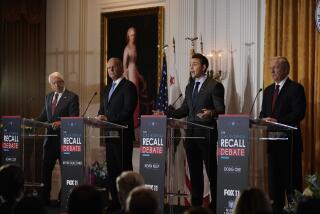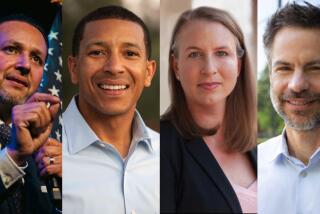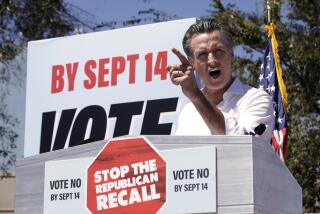Lesser-Known Names Seek to Change Course of Election
- Share via
When a group of eight gubernatorial candidates gathered for a bipartisan power breakfast two Saturdays ago at the ultra-hip Standard Hotel in downtown Los Angeles, it wasn’t the kind of summit most voters have come to expect: no staff. No campaigning. No fund-raising.
They were there to unify, they reminded one another. They swore to maintain their integrity as politicians. They agreed that, as candidates to replace Gov. Gray Davis on the recall ballot, they were at the vanguard of a democratic revolution. One suggested that they all deserved a round of applause for their efforts. They clapped, earning the curious stare of an early-morning, bikini-clad sunbather.
The group might have at least expected to share a toast out on the rooftop. But the waitress was politely shooed away.
“I can’t go over the $1,000 spending limit,” apologized Jon Zellhoefer, a Republican from San Jose. “I’d have to file with the state if I did.”
Six weeks into the recall campaign -- and with just over two weeks left to go, if the courts allow the election to proceed on Oct. 7 -- these are the realities of managing an earnest, though amateur, gubernatorial campaign.
With the emergence of three front-runners -- Lt. Gov. Cruz Bustamante, state Sen. Tom McClintock and Arnold Schwarzenegger -- most of the other people on the 135-candidate ballot have been reduced into an agglomeration of Web sites, photocopied fliers and red-white-and-blue buttons.
A few, including Arianna Huffington, the writer and television commentator, and Peter Camejo, the Green Party candidate, are well-known enough to command platforms of their own.
Garrett Gruener, who made a fortune with the “Ask Jeeves” Web site, has begun to pour large amounts of his own money into his campaign Web site and advertisements on CNN.
As for the rest, they have held debates and auditioned for a game show -- and tonight about 80 of them will appear as audience guests on “The Tonight Show With Jay Leno” -- but for the most part they have provided the campaign with a backdrop of white noise.
Nonetheless, a core group of these “other” candidates refuses to give up on the belief that they can change the course of the election. And even now, with the date of the election uncertain, they continue to send mass e-mails, plan news conferences and discuss platforms.
The “candidates forum,” as they have dubbed themselves, is a nebulous group with members of every recognized party except Peace and Freedom.
This is a group that prides itself on being ordinary. They are committed to openness and multi-partisan agreement -- even though they agree on almost nothing at their weekend gatherings, other than the conviction, however quixotic, that they have the power to influence the outcome of the recall.
The group first gathered on Labor Day weekend for a two-hour closed meeting aboard the Hornet, an aircraft carrier docked in Alameda. The group’s chief objective was to garner media attention for candidates beyond the main field -- and to raise their individual electoral prospects. With a mere 4% of California’s voters planning to support someone other than Bustamante, Schwarzenegger, McClintock, Huffington or Camejo, according to a new poll from the Public Policy Institute of California, that appears to be a fantastic goal.
“Mathematically, they couldn’t win,” said Barbara O’Connor, director of the Institute for the Study of Politics and Media at Sacramento State.
Regardless, when they emerged down the gangway of the ship for a group photo -- instead of “cheese,” they said “Gray Davis” -- many were excitedly chattering about the founding fathers and citizen democracy.
“We’re bordering on a revolt against politics as usual,” said Marc Valdez, an air quality consultant from Sacramento who says he is running to “help Californians choose the lesser of 135 evils.”
A week later, 43 candidates -- a mix of newcomers and people who had attended the Alameda meeting -- again expressed lofty goals when they convened at a Beverly Hills restaurant to craft a joint position statement.
“This group -- collectively -- has a lot of power,” said George B. Schwartzman, an excitable San Diego businessman who is running as an independent. “We control 10, 15, 20% of the vote.”
While O’Connor dismissed such claims, she conceded that the group could conceivably sway a small percentage of voters if it could unite behind a coherent message.
Agreement, however, was in short supply at the Beverly Hills meeting. The group spent the morning bickering over what principles might be equally acceptable to an anti-recall candidate committed to gay rights, an Ayn Rand objectivist and a social conservative who thinks taxpayers should be able to earmark their contributions.
Nonetheless, just before the group issued a brief, vague statement -- “A consensus of us have agreed that this is working” -- Zellhoefer, one of the forum’s main organizers, stood and declared, “We’re doing it. We’re moving this election. We’re going to control the outcome of this election.”
After the meeting, Zellhoefer took a more philosophical view. “If one-tenth of 1% of the voters -- an itty-bitty number -- vote for every one of these people, then I’ve won. I’ve done something that no one else has ever done,” he said. “We’re changing democracy here, and the voters of California can decide if they want that.”
Ned Roscoe, a Napa resident running with the Libertarian Party’s endorsement, remained dubious about the idea that the group was in a position to influence the election.
“There will be a ‘day after’ for all of these candidates,” he said, recalling his experience as a proponent of Proposition 28, a measure to repeal cigarette taxes that failed in 2000. “If you get all your hopes and dreams tied up in this fantasy life, you’re going to be disappointed.”
Other candidates have dismissed the group altogether and have chosen to forge their own campaign trails. Leonard Padilla, president of a small law school in Sacramento, said he attended a recent forum gathering and left convinced it would be his last.
“There is no common ground,” he said. “Some individuals in the group have decent ideas, but there are some people in there who are wackos. They give me a headache.”
And despite claims from some in the forum that the group’s presence was putting pressure on the better-known candidates, representatives from those campaigns said they were not taking the forum candidates into account.
Huffington’s campaign spokesman, Parker Blackman, said her campaign hadn’t really discussed bringing the other candidates under the “alternative” umbrella that the campaign has claimed.
“There’s a difference between Arianna and the 130 who aren’t viable candidates,” Blackman said. “There’s the credibility she brings to the table.”
Such words haven’t discouraged the forum candidates. After the rooftop meeting at the Standard on Sept. 13, some of the candidates went on to an anti-recall rally in Long Beach, where they introduced themselves to a dwindling group of voters, many of whom had turned out to see McClintock speak earlier in the afternoon.
Others went on to the Democratic endorsement conference at the Los Angeles Convention Center, where 11 of them were on the caucus ballot, along with Bustamante. Five got one vote apiece, with 617 delegates voting. The other six got none.
One of those who drew no support, Valdez of Sacramento, had reflected at the Hornet meeting weeks earlier on the possibility that his candidacy would never take off.
“Even if it’s a humiliating defeat, it’ll be worth it,” he said. “The state is in crisis. What’s the point of just sitting around?”
That sentiment, says Mark Baldassare, the director of research at the Public Policy Institute of California, captures the essence of the recall. “People are citing both a lack of leadership and a lack of participation as two troubling elements of where we are in democracy,” he said. “So having 135 candidates on the ballot changes the way we think about political participation. It’s not just about voting -- it’s about running and going to meetings.”
And most of these candidates insist this is not their last run. Jonathan Miller, a Democrat from San Mateo, wants to run for an Assembly seat; others are eyeing seats on a city council or board of supervisors.
Roscoe said he doesn’t know whether he’ll run again, but offered advice for his fellow candidates. “The toughest thing for a novice to understand is that you can have a great idea that hits you in the shower, and no one will find it interesting.”
*
(BEGIN TEXT OF INFOBOX)
Poll watch
This is another in a series of reports examining polls related to the California recall election.
*
Public Policy Institute of California:
What the poll says: Would you vote ‘yes’ to remove Davis as governor or ‘no’ to keep Davis as governor?
Yes, remove Davis: 53%
No, keep Davis: 42%
Don’t know: 5%
*
What the poll says: How would you vote on the second part of the recall ballot?
Cruz Bustamante: 28%
Arnold Schwarzenegger: 26%
Tom McClintock: 14%
Peter Camejo: 3%
Arianna Huffington: 2%
Someone else: 4%
No one/Wouldn’t vote: 5%
Don’t know: 18%
*
What to keep in mind: The three major independent polls taken on the recall over the past two weeks - those by PPIC, the Field Corp. and The Times - have been converging. All three show the race on the recall tightening. The “yes” vote ranged from 55% in the Field Poll released Sept. 7 to 50% in The Times poll released Sept. 10, with PPIC’s figure in between. Given the margins of error in the polls, those numbers are very similar. The “no” vote shows a broader range - 40% in the Field Poll, 47% in The Times Poll, again with the PPIC survey in the middle. On the second part of the ballot, the three polls all show the candidates in the same order with very similar numbers. Schwarzenegger’s support, in particular, has been very consistent, ranging from 22% to 26% in six polls taken by the three organizations over the last month.
*
Results based on a telephone survey in English and Spanish, Sept. 9 - 17, among a random sample of California adults, including 1,033 considered likely to vote in the recall election. The sampling error for the likely voters is +/- 3 percentage points.
*
Source: Public Policy Institute of California
More to Read
Get the L.A. Times Politics newsletter
Deeply reported insights into legislation, politics and policy from Sacramento, Washington and beyond. In your inbox twice per week.
You may occasionally receive promotional content from the Los Angeles Times.











